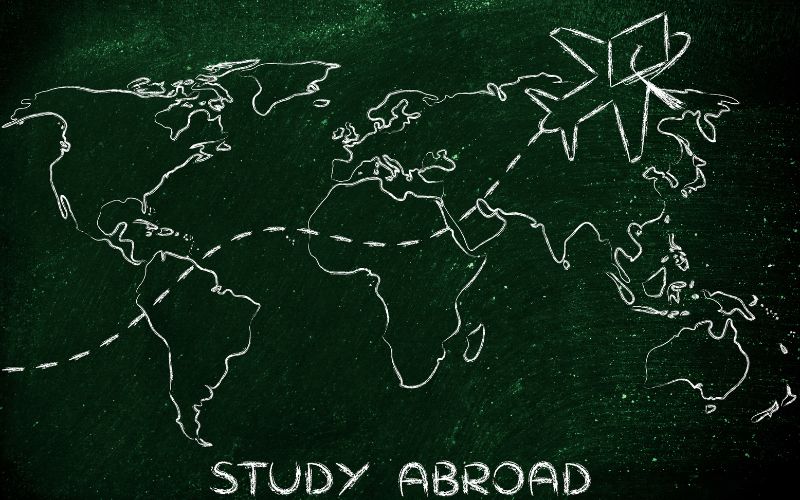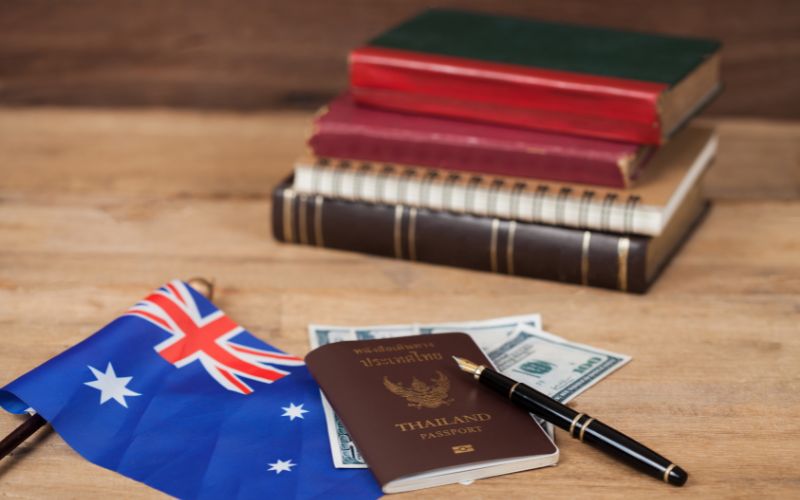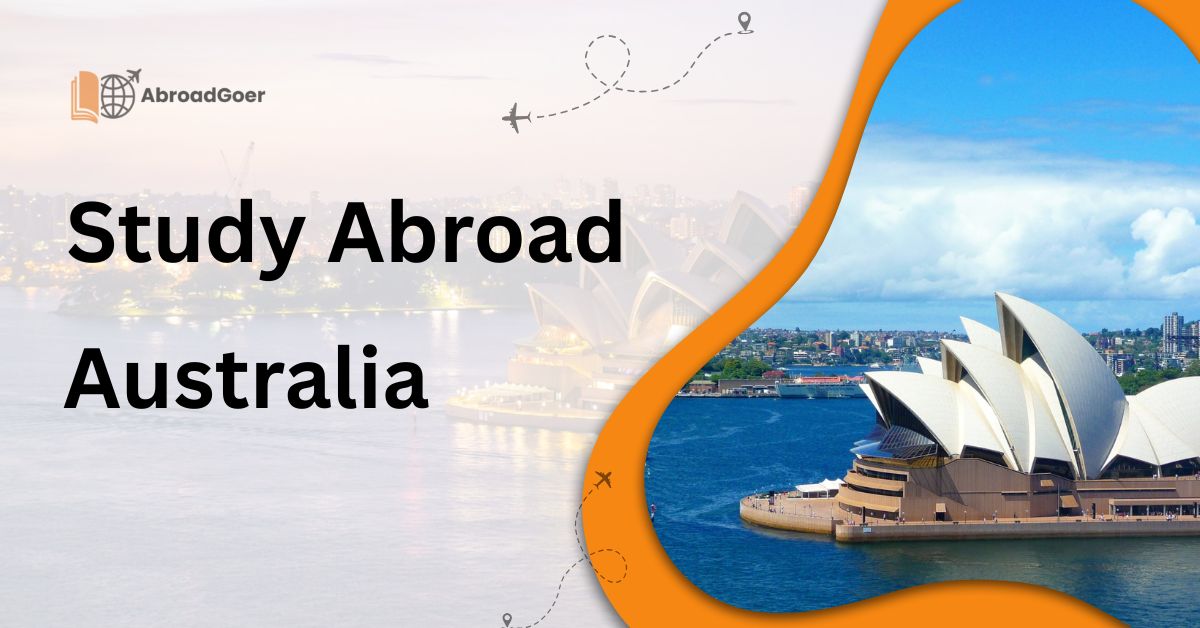Study Abroad Australia Escape Limits Embrace Success
I know many of you have been asking a lot of questions about how to study and live in Australia, so let’s try to clarify. If study abroad Australia is something you are seeking, Australia is not just a location, it’s a vibe. Home to some of the world’s best student cities, it gives students an opportunity to level up in fields such as business, tech, health sciences, and the arts.
And then there was Australia, about getting you real-world-ready. It’s not just academic work; it’s internships, contacts, and cutting-edge research to launch your career. Between a great job market and fantastic support for international students, Australia is sure to get you on the right track. It’s an opportunity to enhance your future.
Why Choose Australia to Study?
While studying abroad, Australia is far from the USA Choosing to study abroad in Australia for a semester, the summer, or even a full academic year might make it one of the greatest experiences of your life. The country is home to natural wonders and unique wildlife, and some of the best universities in the world. Here, you’ll receive a great education, in the classroom and off.
International students who choose to study in Australia will find that the country is rich in culture and variety, from the landscape to democracy; these are just some of the aspects that make the country one of the top destinations for international students. Whether you’re strolling through an art gallery in one of Australia’s bustling cities or bush-whacking your way through suburban parts of the Australian outback, there is no shortage of adventure to be had for any student willing to try something new.

Why have you chosen to study in Australia?
When you want to study in Australia, you’re not only making a good choice; you’re making the perfect one, as it offers you access to some of the finest higher education institutions around the world. I have seen firsthand how Australia has become one of the most preferred study abroad destinations, actually, the most for Pakistanis and Indians. There is abundant research scope for overseas students in the country.
Why Australia is the best for study
Australia’s major cities, such as Melbourne, Sydney, Canberra, Adelaide, and Brisbane, are consistently included in the world’s top 30 cities for international students. This should not come as a surprise, due to the quality of life and academics you’ll find here. You’ll see that there are world-class institutions, with globally recognised degrees and a plethora of scholarships available.
If you want to study an MBA or engineering in Australia, study the humanities or take an English language course, you’ll find Australia can provide you with a world-class education. The strike occupied the second position in the country’s list and even though it is being recognized as one of the best in the world for quality of life, great educational system, and growing economic aspect, it comes second after highlighting education, life.
And they have amazing support for international students. The Incredible Madness Of Studying In Australia. With more than 780,000 students from 192 countries, there’s no question that it’s a crazy time to be a student in Australia. Students from all over the world are chasing their academic dreams here, whether in brief English language courses or bachelor’s and master’s degrees. It’s a place where you can fast-track your career and get a lot of exposure.

Deciding to study in Australia is a big step, and there are a multitude of great reasons why it’s such a good one. Australia, offering a high-standard education system and a friendly environment, is a perfect match for students from around the world. I have observed firsthand how students flourish in Australia’s dynamic society. Here’s a breakdown:
- Quality Education and International Recognition: Australia has one of the world’s best higher education systems, and learning has proven to cultivate a happy and open-minded individual. Australian universities are widely regarded for the highest standard of quality education. The publishing of Australian education is pragmatic, research-focused, and relies on endeavor. You will gain Australian qualifications with international respect and benefit from opportunities for international graduates.
- Lively Culture and Multi-Cultural Student Body: You will have a multi-cultural country with diversity in the student body. This overall makes for a very rich and enriching experience, and a real sense of community among students. Australia is recognised as a safe and welcoming country.
- Post-Study Work Opportunities: Australia is known for its very relaxed post-study work visa schemes that allow foreign nationals who have studied in the country to work after their course completion. A large number of students find work in their area of study soon after graduating, and these Post-study Work opportunities could even lead to prospective permanent residency.
- Additional Advantages:
- Work while studying: International students can work a certain number of hours a week.
- Scholarships and financial aid: The Australian government and universities have various options to offer scholarships and financial aid to international students.
- Quality of life: Australia has an excellent quality of life, great attractions, and safety in many cities.
- English language: The Medium of instruction is in English, so it is easy for international students to live in.
- Research opportunities: Australia is a leader in research and innovation, providing students access to the opportunity to research fascinating projects.
- University Excellence: Australia is home to some of the best universities globally, with Universities like The University of Melbourne, The University of Sydney, UNSW Sydney, Monash University, and The University of Queensland. The following are sizable colleges and universities from Australia with a variety of educational and research opportunities, both at the undergraduate and postgraduate levels.
- Multicultural Experience: Australia is a multi-cultural nation with broad student demographics. This will help to create a dynamic global campus and learning environment.
- International Recognition: Australian degrees and quality-control systems are responsible for Australia’s good reputation and prestige. This is a big asset in terms of getting a job or going to school afterwards.
- Cheap Living Costs: The cost of living in Australia is inexpensive, on the other hand other countries such as the US or the UK. This includes living and food expenses, transportation.
- Beautiful Natural Landscapes: Australia is renowned for its beautiful natural landscapes, from the Great Barrier Reef to the Outback. This enables pupils to take advantage of the country’s distinct natural features whilst learning and studying.
- The Outdoor Lifestyle Australians are known for their outdoor lifestyle and belong to great outdoor swimmers, surfers, and bush walkers, been a CDM Executive summary. This is a wonderful chance for students to enjoy a healthy and active lifestyle as they study.
- Friendly People: Australians are famous for being friendly and welcoming, particularly to overseas students. They are easygoing, friendly, and willing to make friends to help you along the way.
- Rich Culture: Australia has a rich culture, and the Indigenous culture dates back over thousands of years. This is an opportunity for students to learn about and experience the country’s distinct culture and historical past.
- Support services: Australian universities provide a variety of support services for international students, including academic assistance, counseling, and career advice. This means students have access to the tools and support necessary to make sure they are in classes.
- Global Perspective: While you study anywhere in Australia or any other overseas location, you get an opportunity to gain a global perspective. By pursuing studies in Australia, one could learn cross-cultural skills, enhance communication skills, build new networks, higher quality of life. A top university in Australia. The Prestige of studying in one of the world’s best universities in Australia helps international students.
- Career Advantages: The degrees are globally recognized and enable international students to easily obtain lucrative jobs anywhere in the world. They also assist in the employment of a student in multinational corporations that would otherwise be not so easily possible.
The Costs and Visas for Studying in Australia
While you’re researching the possibility of studying in Australia, it’s important to be fully aware of the cost as well as the requirements of a student visa. The price of a course of study in Australia can be wide-ranging. Well, it is up to you. It depends on what kind of qualification you want and the university or school that you select. Veterinary and medical degrees, for instance, always cost significantly more than other degrees. Generally speaking the average tuition fees for higher educaiton in Australia is between AUS20,000 and AUS30,000 per year.
Humanities, arts and educational courses are less expensive, while those that lead directly to professions such as medicine and engineering cost more. If you’re a postgraduate student, expect to pay more. Remember also that the total study costs will be dependent on your course.
For your education study journey, the Subclass 500 student visa is now available from July 1, 2016. With this visa, you can live and learn in Australia throughout the duration of your course programme, which will be determined by your course enrolment dates and also successful completion of your studies. In order to have a smooth passage, it’s important you check for your visa’s validity and your compliance with the conditions listed in your student visa. For heady details I’d suggest looking at the Australian Government’s Department of Home Affairs website. Remember, the price of studying overseas in Australia also differs between cities and universities.

For example, the cost of living in Sydney is higher than in other places you may visit in Australia, so take that into account in making your estimates. It would cost you about $20 for a cheap meal in Australia, and the average Aussie student spends around $60 a week on groceries. If housing isn’t built into your study abroad program’s fees, plan to spend between $900 and $2,500 per month on rent, depending on whether you live in or outside the city center.
Utility costs, for example, can exceed $200 per month, and a cell phone bill can run about $45 per month. A local monthly transit pass will run you around $150, while you could be looking at between $6,000 and $8,000 per semester (tuition included) for a semester in Australia, after airfare and program fees.
Or if you want to save some cash, you might get a part-time, local job while you’re studying abroad. The Australian Student Visa permits them to work up to 40 hours per fortnight. Direct enrollment, skipping the program provider, is another choice that can be less expensive in the end, but it’s a more independent path to take.
| S.no. | Australia Study Program | Average fees in AUD* |
|---|---|---|
| 1. | School | $7,800 to $30,000 annually |
| 2. | English language studies | $350-450 weekly (varies as per course length) |
| 3. | Vocational Education and Training (Certificates I to IV, Diploma and Advanced Diploma) | $4000 – $22,000 annually |
| 4. | Undergraduate Bachelor’s degree | $15,000 – $35,000 annually |
| 5. | Postgraduate Master’s Degree | $20,000 – $42,000 annually |
| 6. | Doctoral Degree | $20,000 – $42,000 annually (attractive scholarships up to 100% available with living grants on meeting the university requirements) |
Australia Study Abroad Programs
Australia, the world’s smallest continent and its 6th largest country, is composed of three time zones. When you pick an Australian study abroad program, you will soon experience the super laid-back nature of the country’s people, the love for the great outdoors, and the totally contagious good vibes. I’ve witnessed how this ambiance can change a study abroad experience. When it comes to choosing where to study abroad in Australia, some factors to think about.
These include making sure your credits transfer, selecting courses that are relevant to your major, and, of course, choosing the right destination. When looking to study a study abroad program in Australia, you don’t just look at the BIG stuff, it’s the small factors too. Take a breath and consider what YOU want to get out of that experience. And never mind what your mum or dad, or distant second cousin (let’s call her Judy), might have to say! Choosing the right study abroad program is crucial, and making full use of these tips as you explore your options is a fantastic shortcut.
Sydney and Melbourne City Choices
Australia’s world-class cities, which are often located on the coast, make a fantastic setting for a study abroad experience of a lifetime. Australia is a land of vastly diverse culture, ranging from its people to its geographical makeup. Let’s talk about Sydney. As the Harbour City, Sydney is an Australian landmark and is home to study abroad students from all over the world. You can also receive a stellar education at universities such as Macquarie University, the University of New South Wales, and the University of Sydney.
Australia’s biggest city is a cosmopolitan city with a laid-back yet vibrant personality, complemented by the Sydney Opera House, beautiful beaches, fantastic sightseeing, and nightlife. There is something for every international student in Sydney, and in the plethora of study abroad Sydney programs ranging from business to biology to performance arts. And on the weekends, Sydney is just a short drive away from the rugged beauty of the Blue Mountains to the west, or a relatively short flight to the Great Barrier Reef in the north. The city’s temperate climate means there’s no bad time to come, and those Sydney sun-soaked rays are all but guaranteed!
And then there’s Melbourne, Sydney’s older, cooler sibling. One whole other Aussie barbecue is served up in Melbourne. The Yarra River snakes between city streets clogged with leafy trees and elaborate examples of Victorian-era architecture, tipping a hat to the area’s early days. As the cultural capital of Australia, Melbourne is a major contributor to the art, music, and coffee scene in Australia. Students can also select study abroad options at institutions including U of Melbourne, Monash University, and RMIT University
Australia Study Abroad Scholarships
Living in Australia is far cheaper than a lot of other European places, however, you’ll more than likely have a huge hole in your bank from the flight alone. Return flight price ranges from 1000~2000 dollars likewise! Just be prepared to pay an arm and a leg just to get there, although I think it is probably worth it. But fortunately, there are many ways to less the heavy expenditures attached to studying abroad in Australia. One of the best is to apply for a lot of these scholarships that are oriented specifically to studying overseas and traveling.

A key hint: Verify with your home university if your current financial aid package transfers to your study abroad experience. For example, the Australian Leadership Award scholarships, which are awarded to more than 200 scholars annually, support scholars to develop their leadership capacity. IES Abroad also provides a range of scholarships for students attending their programs, and they have some excellent options throughout Australia. And there are non-profit organizations like USAC, which creates study abroad scholarship opportunities with the mission of helping students experience international education on a budget.
Here’s a breakdown of some specific scholarship programs available for studying in Australia:
| S.No. | University | Year | Scholarship Name |
|---|---|---|---|
| 1 | University of South Australia | 2025 | Vice Chancellor’s International Excellence Scholarship |
| 2 | Deakin University | 2025 | Deakin Vice-Chancellor’s Meritorious 100% Scholarship |
| 3 | La Trobe University | 2025 | La Trobe High Achiever Scholarship |
| 4 | Flinders University | 2025 | Excellence Scholarships |
| 5 | Flinders University | 2025 | Vice-Chancellor International Scholarships |
| 6 | Flinders University | 2025 | Vice-Chancellor International Scholarships |
| 7 | Bond University | 2023/24 | UG Excellence (50) |
| 8 | Bond University | 2023/24 | International Stand Out |
| 9 | Bond University | 2023/24 | International Stand Out |
| 10 | Bond University | 2023/24 | UG Excellence (50) |
| 11 | Bond University | 2023/24 | International Stand Out |
How does studying in Australia compare to the UK?
There are some differences for international students who are thinking about studying in the UK and Australia. UK has well-reputed universities and also provides shorter length master’s programs, sometimes in very lively cities. There will be a lot of history and culture there, which can fire the imagination.
Countries, after all, like France, Italy, Greece, and India are nearby. Many of the greatest writers in the English language were born and brought up there (Chaucer, Shakespeare, Milton, Byron, Blake, Dickens, Orwell, Huxley, Tolkien), or moved there and wrote there (Oscar Wilde, Yeats, Sylvia Plath, Ezra Pound, T.S. Eliot, Nabokov). Oxford or Cambridge, if you wrote well and didn’t want to be a nurse.
Australia, on the other hand, provides a more laid-back approach to life and longer post-graduation working rights, at the possible expense of permanent residency. It’s a generally pleasant place to live: big, bright, and roomy. The UK can be small and crowded, and even dark, grimy with areas of poverty, and all that; Its winters are dark.
Aus, however, while it might sometimes appear bland and suburban (unless you like beaches and sports), has cities like Melbourne, which should generally be safe. If you’re an average student who wants to study something like computing or engineering, Australia might be a good match.
But context is important here. Though some of them may appear to be cheaper, international fees for studying in Australian universities under the various programs are often detailed on each university’s website. For example, a Bachelor of Arts (BA) at University of Sydney may be around $40K p.a., and Bachelor of Engineering (BEng) at Monash might be around $50K p.a. Australia is an expensive place to live, and there could be living costs that go up to $25K p.a. Working the maximum allowed — 10 hours a week — can help, but it won’t make a big dent in these costs.
Be careful of the new rapidly growing underground ‘fake study’ racket, with private ‘colleges’ offering ‘cooking courses’ which may teach you nothing, and which might only let you work 80-hour weeks at convenience stores for starvation wages. These institutions would charge a fee of about $10K for students to exploit the visa system. If you just want any degree, from anywhere, you could find it hard to get a student visa.







